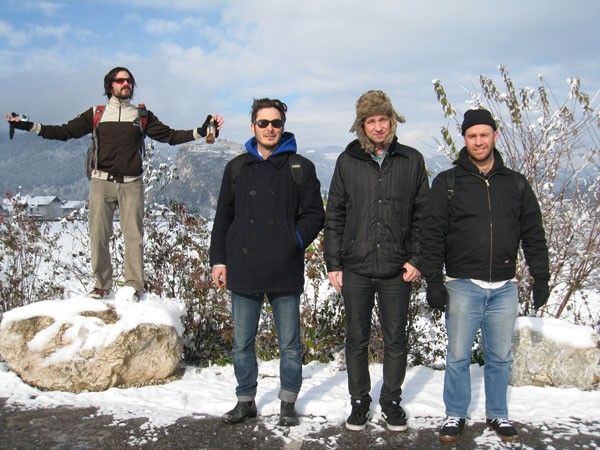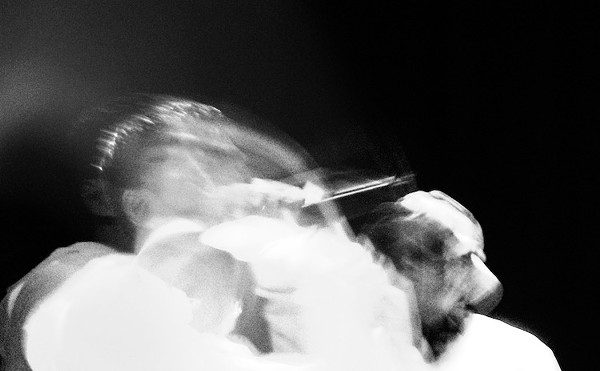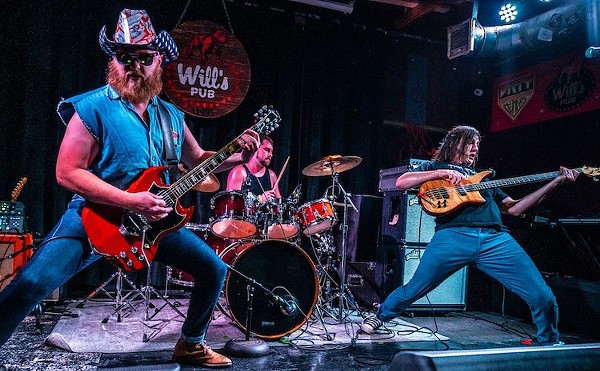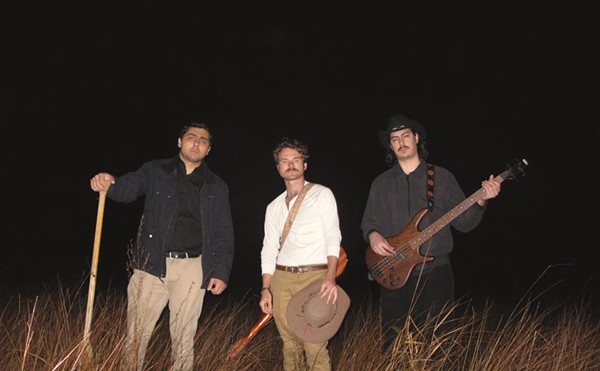Joan of Arc
with Pillars & Tongues,the Pauses, Nicole Migilis
8 p.m. Tuesday, Jan. 25
Back Booth,
407-999-2570
www.backbooth.com
$10-$12
Tim Kinsella, guitarist and vocalist for Joan of Arc, has a basic way of summarizing how his band’s records come together: “Simple Marxism.” For the experimental outfit, an album is determined by what’s happening in the community of JOA players – who could record, when they’re free, whether they have other commitments like a job or a girlfriend, and so on. This is how the recording process is shaped when a band is so loosely defined. One JOA project might be the product of 30-plus members; another might come from a barebones lineup. Kinsella, who is also the Chicago-based group’s commander and lone permanent member, says, “We don’t really even know who is in the band a lot of the time.”
For Kinsella, though, this malleability is a good thing, and Joan of Arc, the people (which has included Tim’s brother Mike and cousin Nate) outweigh Joan of Arc, the performers. “The band is a framework for our friendship. It’s just a way for us to hang out and talk. The friendships are definitely prioritized over the career or something,” Kinsella says. “Now, it’s like we don’t bother breaking up.”
This structure is one of the many unusual things about how Kinsella and company treats the band. Even the band’s leader isn’t desperately devoted to the project, despite having overseen well over 10 albums under the JOA name. Kinsella started his first band at age four and has been a prolific musician ever since as a member of JOA, Cap’n Jazz, Make Believe, Owls and a handful of other groups. Still, he mentions recently finalizing a novel and going two weeks without picking up a guitar and feeling perfectly fine about it. In a way, his bluntly non-committal attitude is refreshing; Kinsella’s content to let inspiration come to him, and there’s more to his life than just music.
These revelations might make JOA’s actual sonic output sound like some kind of afterthought, but it’s remained fertile and strange after 16 years worth of shifts. Imagine the collected Joan of Arc discography as a handmade and weirdly shaped kaleidoscope where every rattle means vastly different images and sounds. Sometimes, the patterns are clear and attractive, and the sounds make sonorous, if imprecise, hooks. At other times, the picture is blurry, accompanied by low-key, navelgazing electronic tinkering, like music conceived on an obscure planet. Give it another shake and you’ll hear a fearsome post-punk jangle.
Kinsella’s voice is one of JOA’s few constants – a scraggly yelp that only occasionally aims for traditional beauty. But making something pretty is not the point for JOA. It’s about chasing whatever inclinations they feel are worthy of attention, investing some thought in that concept and generating something from it. Consider what the original lineup contemplated in the mid-’90s. Before they made a record or played a show, they purposely decided that they wanted to evade every genre they could. “We talked a lot about how to make music for no audience, so that we couldn’t fall back on some sort of genre signifier,” Kinsella says. “We all liked a lot of different kinds of things.”
Joan of Arc’s upcoming record, Lifelike, will be a straightforward piece of work. According to Kinsella, it’s been recorded live and includes only three overdubs and zero backing vocals.
“We definitely thought we were making our version of a classic rock record, but the label [Polyvinyl] got it and was like, ‘Oh, that’s not classic rock,’” Kinsella says. “We certainly have our tastes and biases come through. [On] the first song, the vocals don’t come in until eight minutes, so even that as a simple arrangement technique is different than most rock band records.” Joan of Arc’s unpredictability, of course, always means that there’s no telling where exactly they will head after this. “Our next record could easily be all computers,” ponders Kinsella, “or all drone chamber pop.” Despite their highfalutin experimentation and artistry, Kinsella believes that there’s something playful about JOA’s work.
Constant fluctuations in lineup and style keep them youthful. Once that bulky, confounding discography has been completed and is sitting in one pile, he wants Joan of Arc’s shape-shifting sensibility to make an impression.
“Saying that we remained aware and present is the ultimate ambition. I don’t know how else to find meaning in this, except for really trying to be excited about what’s happening in the immediate and not thinking that this is a means to get to somewhere else or a tribute to the past,” Kinsella says. “[It’s about saying,] ‘This is what we should be doing right now.’”

















